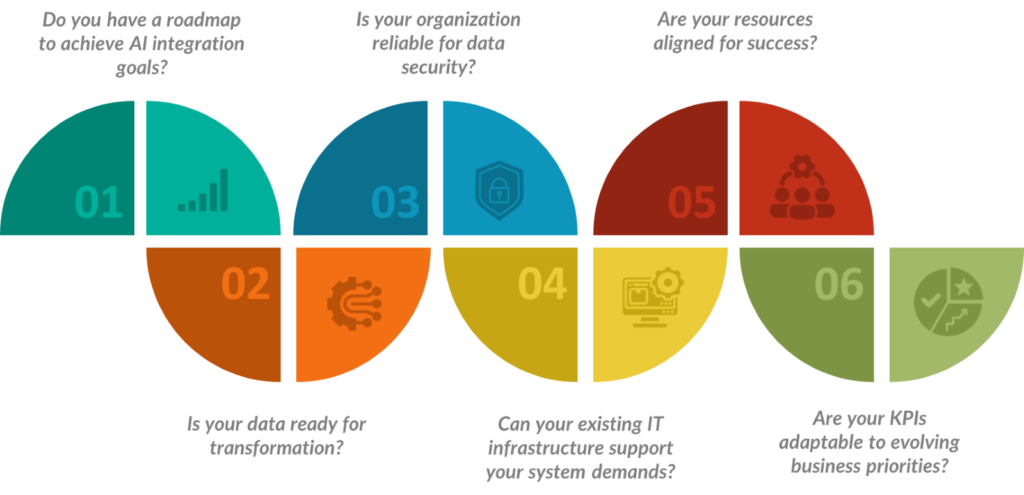Salesforce Einstein AI has revolutionized modern business transformation by embedding advanced AI features into the core Salesforce platform. This powerful CRM enables seamless integration of AI technology, specifically Salesforce Einstein AI, to enhance various aspects of your service business. In this blog, we’ll delve into the checklist for AI-preparedness to ensure the smooth incorporation of Salesforce Einstein AI and explore its pivotal role in reshaping business operations.
Let’s dive deeper into the world of Salesforce Einstein AI and uncover how it can elevate your service business to new heights!
Elevate Your Business with Salesforce Einstein AI: Top Four Ways
Salesforce Einstein AI is not just a technological solution; it’s a catalyst for transformative business growth. Here are top four ways to elevate your business with Einstein AI Analytics:
1. Greater ROI with Informed Decision-Making:
With Salesforce Einstein AI, you gain valuable insights into your customers, business operations, and industry dynamics, empowering you to make intelligent decisions. Whether it’s identifying trends, predicting future outcomes, or understanding customer behavior, Einstein ensures that you’re well-equipped for informed decision-making.
2. Foresight with Predictive Analytics:
Harnessing predictive analytics, the platform empowers businesses to foresee upcoming trends, pinpoint opportunities, and anticipate the evolving needs of customers. For instance, Salesforce Einstein AI can anticipate customer churn, evaluate the likelihood of lead conversions, and project sales for the coming quarters.
3. Efficiency with Task Automation:
Salesforce Einstein AI takes charge of automating tasks such as lead routing, data entry, and customer service, liberating employees to concentrate on strategic responsibilities and providing an enriched customer experience.
4. Tailored Interaction with Personalized Customer Experiences:
Salesforce Einstein AI plays a key role in shaping personalized customer experiences through tailored recommendations, exclusive offers, and dedicated support. For example, it can suggest products aligned with customer interests, provide discounts to retain customers, and offer personalized assistance to those facing challenges.
Read More: Salesforce Implementation Guide and Best Practices
Transforming Sales Operations with AI: A Salesforce Einstein AI Success Story
Organization: ZYBTech Dynamics
Challenge: ZYBTech Dynamics Inc., a leading tech company, faced challenges in optimizing its sales process. The sales team struggled with identifying the most promising leads and tailoring their approach to individual customer preferences. The lack of personalized engagement resulted in lower conversion rates and missed revenue opportunities.
Solution: ZYBTech Dynamics decided to leverage Salesforce Einstein AI to enhance its sales strategy. They integrated Einstein Lead Scoring to prioritize leads based on their likelihood to convert. Additionally, they implemented Einstein Recommendation Builder to provide personalized product recommendations for each customer.
Implementation Steps:
- Einstein Lead Scoring: Salesforce Einstein analyzed historical data on lead interactions and converted opportunities. It then created a predictive model that assigned scores to leads, helping the sales team focus on high-potential prospects.
- Einstein Recommendation Builder: ZYBTech Dynamics integrated customer data, including purchase history and preferences, into Salesforce. Einstein Recommendation Builder then generated tailored product recommendations for each customer, improving the cross-selling and upselling opportunities.
Outcomes:
- Improved Lead Conversion Rates: Utilizing Einstein Lead Scoring, the sales team can efficiently prioritize leads, leading to an anticipated increase in lead conversion rates. This enables them to concentrate efforts on leads with higher conversion potential.
- Enhanced Customer Engagement: Einstein Recommendation Builder empowers you to provide personalized product recommendations, anticipating a positive response from customers. This is expected to result in an increase in the average order value as customers respond favorably to tailored suggestions.

AI Preparedness: A Comprehensive 6-Point Checklist
This checklist is meticulously crafted to guide organizations through the essential steps for a seamless and successful integration into the world of artificial intelligence. Let’s delve into each step in detail:

1. Do you have a Roadmap to Achieve AI Integration Goals?
Clear business objectives act as a guiding light for a successful integration journey. By articulating specific, measurable, achievable, relevant, and time-bound (SMART) objectives, organizations create a roadmap that ensures alignment with overarching goals. Collaborating with stakeholders and leadership is key to guaranteeing that these objectives seamlessly integrate with the overall organizational strategies, fostering a unified and strategic approach to AI implementation.
2. Is your Data Ready for Transformation?
Evaluating data readiness is a crucial step in ensuring a strong foundation for AI implementation. This involves a meticulous assessment of the quality, diversity, and availability of data. Conducting a comprehensive data audit allows organizations to identify strengths and weaknesses in their datasets. Establishing protocols for ongoing data maintenance is equally important to support effective AI deployment, ensuring that the data ecosystem remains robust and adaptable to evolving needs.
3. Is your Organization Reliable for Data Security?
Adhering to regulations and ethical standards is essential for building trust in AI systems. Organizations need to familiarize themselves with relevant data protection regulations and ethical guidelines. This step involves close collaboration with legal and compliance teams to ensure a comprehensive understanding of regulatory requirements. Implementing policies that align with ethical AI practices is imperative, safeguarding both the organization and its stakeholders.
4. Can your Existing IT Infrastructure Support your System Demands?
The assessment of existing IT infrastructure is a critical aspect of supporting the computational demands and scalability requirements of AI systems. Organizations need to evaluate the current state of their IT infrastructure, including hardware, software, and network capabilities. Engaging with IT experts is essential to assess capacity and compatibility. Planning for necessary upgrades or investments ensures that the infrastructure is well-prepared to support the deployment and integration of AI technologies seamlessly.
5. Are your Resources Aligned for Success?
Adequate resource allocation is pivotal for the success of AI integration. This involves allocating resources based on the scope and complexity of AI initiatives. Collaboration with finance and HR departments is crucial to secure the necessary budget, identify skill gaps, and invest in training programs. Ensuring the availability of necessary technology tools and platforms completes the resource allocation process, providing a solid foundation for the organization’s AI endeavors.
6. Are your KPIs Adaptable to Evolving Business Priorities?
Well-defined Key Performance Indicators (KPIs) provide a structured framework for measuring the success and impact of AI initiatives. Organizations need to define measurable KPIs that align with business objectives. Collaborating with stakeholders to identify key metrics and implementing tools for tracking and analyzing KPI data regularly ensures that the organization can measure progress effectively. Adjusting KPIs as needed to reflect evolving business priorities allows for continuous improvement and alignment with strategic goals.
The Bottom Line
Successful AI integration isn’t merely a technological upgrade; it’s a strategic investment in your business’s future. By adopting these steps for AI-preparedness and embracing Salesforce Einstein, you unlock a realm of possibilities for enhanced decision-making, increased productivity, and sustained growth. Seize the power of AI to elevate your business into a new era of excellence.
Author

Service Cloud/Field Service Specialist

Ali Zakir is a Salesforce consultant/advocate specializing in Service Cloud and Field Service. With 25 years of experience in IT business management and operations, Ali empowers organizations to go beyond solving complex customer challenges and meeting business requirements.





